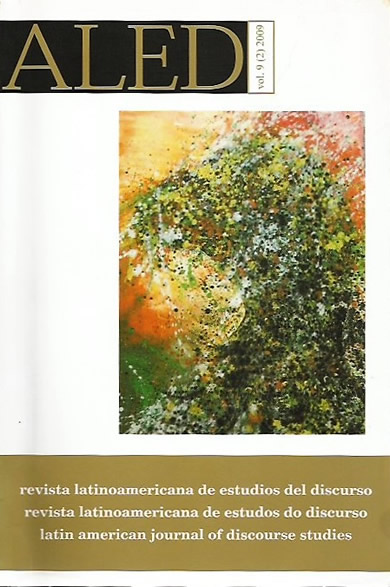La función de la modalidad interrogativa en la conversación
DOI :
https://doi.org/10.35956/v.9.n2.2009.p.81-99Mots-clés :
modalidad interrogativa. elicitación. polaridad. preguntas retóricas. interacción. conversación informal.Résumé
La conversación es un resultado de un proceso de co-construcción llevado a cabo por sus participantes (Linell, 1998), quienes utilizan frecuentemente la modalidad interrogativa en sus intervenciones. Las distinciones gramaticales entre preguntas totales y parciales no resultan suficientes para abordar el análisis de la presencia constante de esta modalidad en las conversaciones. Tanto el Análisis de la conversación (Schegloff, 2007) como las perspectivas sociopragmáticas, (Heritage, 2002; Koshik, 2003; Heinemann, 2008) proveen algunas explicaciones funcionales específicas. A partir de un corpus de veinticuatro conversaciones entre estudiantes universitarios, este trabajo se centra en el análisis del uso de las preguntas de elicitación y de aquellas que, aun cuando no sean conducentes a una respuesta, contribuyen también con diferentes valores al dinamismo discursivo de la interacción.
Téléchargements
Références
Bello, A. (2005 [1847]). Gramática de la lengua castellana. Madrid: Instituto Cervantes.
Bosque, I. (ed.) (2009). Nueva gramática de la lengua española. Madrid: Espasa.
Brown, P. y Levinson (1987). Politeness. Some Universals in Language Use. Cambridge: CUP.
Di Tullio, Á. (1997). Manual de gramática del español. Buenos Aires: EDICIAL
Ducrot, O. (1984). El decir y lo dicho. Barcelona: Paidós, 1986
Dumitrescu, D. (1992) “Estructura y función de las preguntas retóricas repetitivas en español” AIH ACTAS. IRVINE 92, 140-147.
Heinemann, T. (2008). “Questions of accountability: yes-no interrogatives that are Unanswerable”. Discourse Studies, 10(1), 55-71.
Heritage, J. (2002). “The limits of questioning”, Journal of Pragmatics, 34 (2002) 1427”“1446.
Hutchby, I. (1996). Confrontation Talk. New Jersey: Lawrence Erlbaum Ass. Publ.
Koshik, I. (2002). “A conversation analysis of yes/no questions” J.Pragmatics, 34, 1851-1857.
Koshik, I. (2003). “Wh questions used as challenges”. Discourse Studies, 5, 51-77
Koshik, Irene (2007). Beyond Rhetorical Questions. Assertive questions in everyday interaction. New York: John Benjamins
Labov, W. (1972). “Transformation of syntax into narrative experience”, en: Lan- en: Language in the inner City, Philadelphia: University of Pennsylvania.
Labov, W. y Fanshel, D. (1977). Therapeutic Discourse: Psychotherapy as Conversation, New York: Academic Press.
Linell, P. (1998) Approaching Dialogue. Talk, Interaction and Contexts in dialogical perspectives. Amsterdam: John Benjamins Publishing Company.
Quirk, R.; Greenbaum, S.; Leech, G. & Svartvik, J. (1985). A Comprehensive Grammar of the English Language. New York: Longman.
Sacks, H., Schegloff, E. y J., Gail (1974). “A simplest systematics for the organization of turn-taking in conversation”. Language, 50, 696-735.
Schaffer, D. (2005). “Can rhetorical questions function as retorts?” J. Pragmatics, 37, 433-460.
Schegloff, E. (2007) Sequence Organization in Interaction, Cambridge: CUP.
Schmidt-Radefeldt, Jürgen (1977) “On So-Called ‘Rhetorical’ Questions.” Journal of Pragmatics 1, 375-392.
Steensig, J. & Drew, P. (2008) “Introduction: questioning and affiliation/ disaffiliation in interaction”. Discourse Studies, 10, 5-15.
Uwajeh, M.K.C. (1996). “Is ‘May I ask you a question’ a Question?” Pragmatics, 6, 89-109
Wang, J. (2006). “Questions and the exercise of power”. Discourse & Society, 17, 529-548.
Téléchargements
Publié-e
Comment citer
Numéro
Rubrique
Licence

Cette œuvre est sous licence Creative Commons Attribution - Pas d'Utilisation Commerciale - Pas de Modification 4.0 International.
Los/as autores/as conservan los derechos de autor/a y garantizan a RALED el derecho de ser la primera publicación del trabajo al igual que licenciado bajo una Creative Commons Attribution License BY-NC-ND 4.0 que permite a otros compartir el trabajo con un reconocimiento de la autoría del trabajo, copiar y redistribuir el material en cualquier medio o formato.
Os/As autores/as conservam os direitos autorais e garantem a RALED o direito de ser a primeira publicação do trabalho licenciado por uma Creative Commons Attribution License BY-NC-ND 4.0 que permite compartilhar o trabalho com reconhecimento de sua autoria e cópia e redistribuição do material em qualquer meio ou formato.







